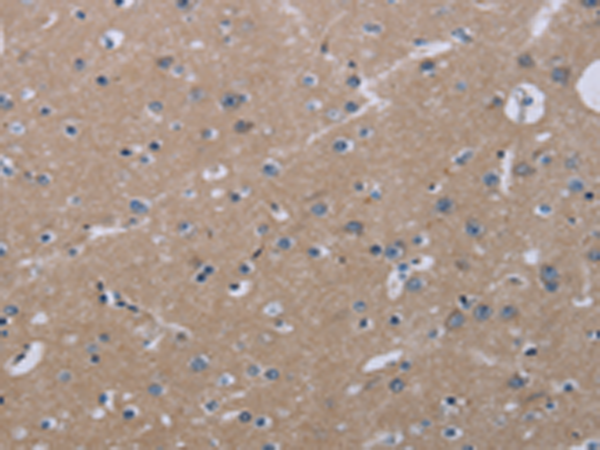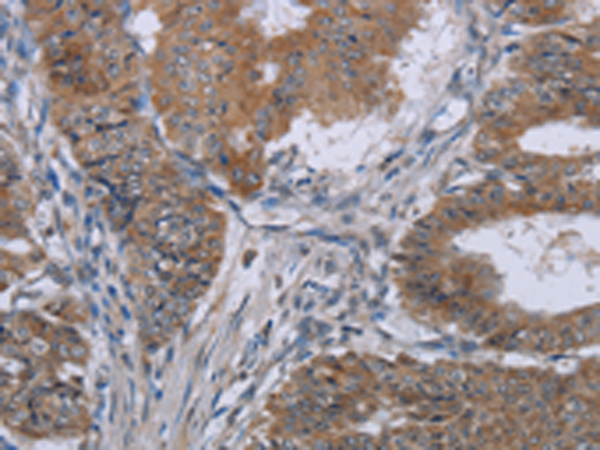


| WB | 咨询技术 | Human,Mouse,Rat |
| IF | 咨询技术 | Human,Mouse,Rat |
| IHC | 1/25-1/100 | Human,Mouse,Rat |
| ICC | 技术咨询 | Human,Mouse,Rat |
| FCM | 咨询技术 | Human,Mouse,Rat |
| Elisa | 1/1000-1/2000 | Human,Mouse,Rat |
| Aliases | MAV; MAYVEN; ABP-KELCH |
| WB Predicted band size | 66 kDa |
| Host/Isotype | Rabbit IgG |
| Antibody Type | Primary antibody |
| Storage | Store at 4°C short term. Aliquot and store at -20°C long term. Avoid freeze/thaw cycles. |
| Species Reactivity | Human, Mouse, Rat |
| Immunogen | Fusion protein of human KLHL2 |
| Formulation | Purified antibody in PBS with 0.05% sodium azide and 50% glycerol. |
+ +
以下是关于KLHL2抗体的3篇参考文献及其摘要内容的简要概括:
---
1. **文献名称**: *KLHL2 interacts with and regulates the expression of the Ca²⁺-activated Cl⁻ channel TMEM16A*
**作者**: Zhang Y, et al.
**摘要**: 本研究利用KLHL2抗体通过免疫共沉淀(Co-IP)技术,发现KLHL2与跨膜蛋白TMEM16A存在直接相互作用,并参与调控其稳定性及氯离子通道功能。研究揭示了KLHL2在细胞离子稳态中的潜在作用机制。
2. **文献名称**: *KLHL2 suppresses cell migration by inhibiting mTORC1 signaling in renal cell carcinoma*
**作者**: Liu X, et al.
**摘要**: 通过Western blot和免疫组化实验(使用KLHL2抗体),作者发现KLHL2在肾癌细胞中低表达,并证明其通过抑制mTORC1通路降低肿瘤细胞的迁移能力,提示KLHL2可能作为抑癌因子发挥作用。
3. **文献名称**: *KLHL2-mediated ubiquitination regulates the degradation of WNK kinases in the kidney*
**作者**: Chen J, et al.
**摘要**: 该研究利用KLHL2抗体在小鼠肾脏组织中发现KLHL2通过泛素化修饰调控WNK激酶的降解,进而影响钠离子重吸收。这一机制为高血压相关疾病的分子机制提供了新见解。
---
以上文献均涉及KLHL2抗体的实验应用(如蛋白互作、表达分析),并探讨KLHL2在不同生理病理过程中的功能。如需具体文献来源,建议通过PubMed或期刊数据库检索标题或作者名获取全文。
The KLHL2 (Kelch-like family member 2) antibody is a tool used to study the KLHL2 protein, a member of the Kelch-like family characterized by its BTB (Broad-Complex, Tramtrack, and Bric-à-brac) domain and Kelch repeat motifs. KLHL2 functions as a substrate-specific adaptor for Cullin3 (Cul3)-based E3 ubiquitin ligase complexes, facilitating the ubiquitination and subsequent degradation of target proteins. This protein is implicated in cellular processes such as cytoskeletal organization, ion channel regulation, and neuronal development. Its role in ubiquitination pathways links it to maintaining cellular homeostasis and stress responses.
KLHL2 antibodies are widely employed in research to detect protein expression, localization, and interactions via techniques like Western blotting, immunohistochemistry, and immunoprecipitation. Studies have explored KLHL2's involvement in diseases, including cancers and neurological disorders, where dysregulation of ubiquitination may contribute to pathogenesis. For example, KLHL2 has been shown to regulate N-type voltage-gated calcium channels in neurons, influencing synaptic transmission.
Antibody specificity is validated using knockout controls or siRNA-mediated knockdowns to ensure reliable results. Commercially available KLHL2 antibodies are typically raised in rabbits or mice, with reactivity confirmed across human, mouse, and rat samples. Ongoing research aims to clarify its tissue-specific roles and therapeutic potential in ubiquitin-proteasome system-related pathologies.
×